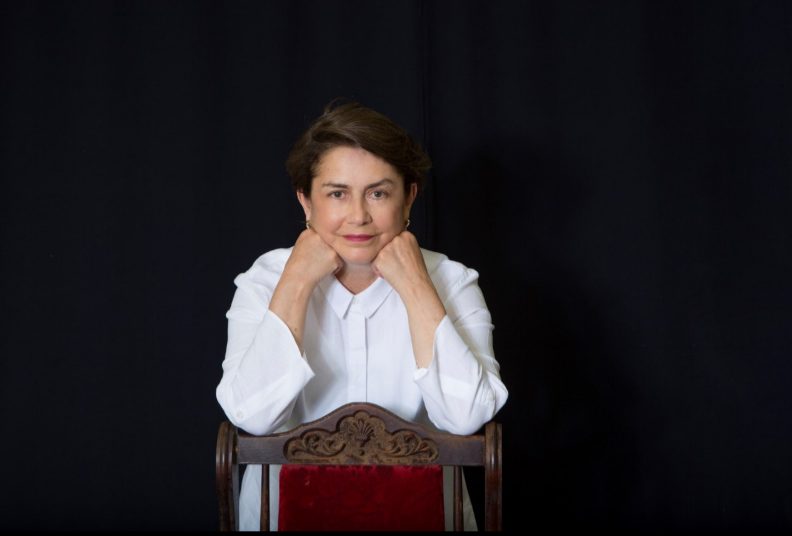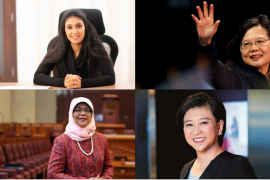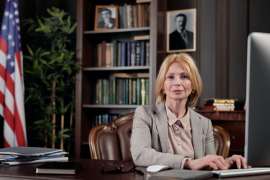In this exclusive interview with the Amazons Watch magazine, the Spouse of the President of Armenia discussed the gender gaps and challenges of women in Armenia and some of the efforts of the government in tackling them. Excerpt:
Your Excellency, thank you for granting us this opportunity to interact with you. In describing your childhood, you have been quoted to have said that you don’t have a rich family background, but had enough money to feed and clothe yourselves. Kindly tell us more about your background and some of your experiences growing up in Soviet Armenia.
I was born into an intellectual family in the Republic of Armenia, USSR. My father was a writer and journalist. My mother was a teacher of Armenian language and literature.
I went to a school where the English language was taught parallel to Armenian and Russian. We were staging Bernard Shaw’s and Shaespear’s plays in original language. I considered myself lucky to have the parts of Eliza Doolittle “Pygmalionˮ, and Cordelia “King Learˮ and Juliet “Romeo and Julietˮ. The schools gave us excellent education.
The life in the communist regime was harsh and difficult, with restricted freedom. There were no rich or poor people. My parents were making enough money to buy food, clothes and books. My mother’s salary was spent on transport, food and clothing, my father’s – on books. Most of objects of necessity were considered to be a luxury, including good books. One had to register, queue and wait for months for a good dictionary or a novel. Many books were forbidden, like “Master and Margaritaˮ by Bulgakov, so we were secretly circulating them among us, teenagers. In spite of all restrictions and lack of goods, we – children of Soviet society were getting excellent education for free.
We learnt that you worked at the Research Institute of Ancient Manuscripts in Yerevan, after graduating from Yerevan State University. Please tell us about your professional activities in your country.
Matenadaran, one of the largest manuscript depositories of the world was a unique institution. While working there I had the opportunity to meet with many scholars and look at thousands of medieval manuscripts with gorgeous skillfully done illustrations and improve my professional skills on Medieval Armenian art and history. I was paid very little, but so-called material life was not a priority.
Parallel to my work at the Institute, I started to write essays for the Armenian Radio on culture as well as about the work of prominent artists and musicians. I have made up a rich basis for myself, based on my work and our family library.
We understand that in 1991 you relocated to London with your family, and started writing articles on art, music and culture, as well as authoring stories for children. Kindly share with us your experience living with your family in London and how the Western Culture affected your writings and professional activities.
We, as a family of four, my husband Armen Sarkissian, my two sons Vartan and Hayk and I, settled down in London in 1991. We have been connected with the West since 1984, due to the work of my husband, who used to be a physicist.
Once my husband became the first Ambassador of the independent Republic of Armenia in the UK, I entered the Department of History of Art at Goldsmiths’ College, London University and graduated with an MA. Art became my priority and I did numerous courses at Sotheby’s Auction House, Christie’s Auction House and at Westminster College – to improve my drawing and painting skills. I continued to write on Art and artistic people for newspapers of Armenian Diaspora.
For many years I dedicated my time and energy to International and Armenian charities, raising funds through concerts of classical music, inviting famous musicians, choirs and orchestras for good causes.
Your books, including The Magic Buttons, which is the first to be published in English, teach children to love and respect moral values, and also to be resourceful and brave in defending same. What inspires your literary writing?
Our world is complicated. It is becoming more and more difficult to preserve moral values in such a complex environment for very young minds. It is extremely important priority for my generation to present to the young generation of our children and in my case – grandchildren, values like kindness, love, family, friendship and through books and word of mouth. It is important to teach them not to be lazy and to have goals and to have dreams in their lives. That is why I spend a lot of time visiting schools for talks and workshops with children. Good moral and disciplinary values are shaped in human beings at the very early age, during childhood, that’s why it is utmost importance to pay more attention on the education of children at nurseries and schools.
The world of children is different. It is not easy to write for them. One has to look at things through their prism and keep them still interested with books in the huge flow of electronic information around them.
I find inspiration for my books in the world of children who I love.
Research has shown that gender imbalances and inequality remain salient in Armenia in terms of women’s access to economic opportunities, underrepresentation in leadership roles, and health and survival. According to the World Economic Forum (WEF) Global Gender Gap Index 2017, Armenia is ranked 97th among 144 countries. What are your thoughts on gender inequality and efforts to close gender gaps?
We attach a great importance to this issue. I would like to stress that participation of women in our economy has dynamically increased during recent years. This also creates necessary guarantees and sustainable grounds for reducing poverty, consumption and income gap between the men and women in our society.
We constantly invest in women’s economic empowerment as it sets a direct path towards gender equality and inclusive economic growth. Women make enormous contributions to economies, whether in business, on farms, as entrepreneurs or employees, or by doing unpaid care work at home.
Improvement in women’s economic activity has also led to the strengthening of their political activity and today we already have many successful examples.
At present the Government has initiated the development of new strategy for 2019 -2023on providing equal rights and equal opportunities for women and men. This long-term action plan would explicitly address all areas that involve women as participant and/or final user. And on everyday basis, policies will target the elimination of existing gaps and the prevention of new ones.
Domestic violence has been a prevalent problem for Armenian society. Statistics from women’s rights NGOs reveal that there were 602 cases of domestic violence officially registered by the Armenian police in 2017, as at October; and from 2010 – 2017, at least 50 women were killed by their partners or ex-partners. Remarkably, the National Assembly of Armenia in 2017 adopted legislation aimed at combating domestic violence by introducing criminal and administrative liability against those found guilty of the crime. What are your thoughts on domestic violence and abuse in the country, and do you think this legislation and its full implementation will be effective in reducing the worrisome trend in the country?
It is also a very important issue, as until the adoption of the “Law on Prevention of Violence within the Family, Protection of Victims of Violence within the Family and Restoration of Peace in the Family” in December 2017, there have been no specific regulations in place on domestic violence, and the Criminal Code regulated acts of violence against women in general. In January 2018, Armenia signed the Council of Europe Convention on Preventing and Combatting Violence against Women and Domestic Violence (Istanbul Convention).
Now we witness raise of public awareness, which together with the implementation of respective laws play significant role in violence prevention, which is also another major factor in violence elimination.
I strongly believe that undertaken actions would result in significant improvement of situation.




